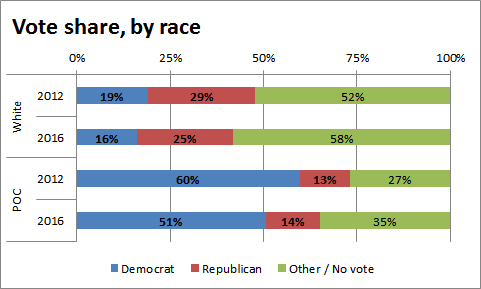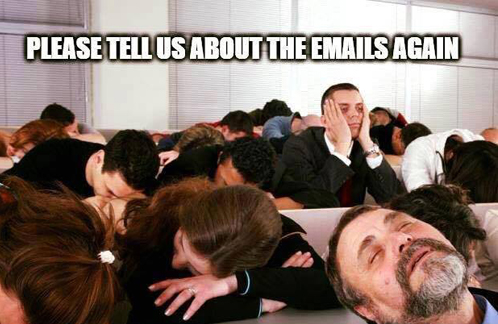Updating the last post, on the Republican “repeal and delay” plan for getting rid of Obamacare — members of the House “freedom” caucus are making noises that they won’t go along.
The Republican congressman who made his name as the instigator of John Boehner’s ouster last year was set to take the reins of the House Freedom Caucus on Monday night.
And first up on Rep. Mark Meadows’ to-do list: Torpedoing GOP leadership’s tentative plans to take as long as three years to replace Obamacare.
The proposal “will meet with major resistance from Freedom Caucus members,” the North Carolina Republican vowed in an interview, calling it “the first big fight I see coming for the Freedom Caucus.”
“It should be repealed and replaced, and all of that should be done in the 115th Congress” — the two-year period starting in January through 2018 — and “not left to a future Congress to deal with,” Meadows added.
Bless their empty little hearts and clueless little heads — that would actually be principled. And, look, GOP, the shit from cutting people off from healthcare is gonna hit the fan sometime. Do you want it to be before the 2018 midterm election or the 2020 general election?
In other news, Pathology-elect Donald Trump caused an uproar when he tweeted disapproval of the alleged costs for updating Air Force One:
Boeing is building a brand new 747 Air Force One for future presidents, but costs are out of control, more than $4 billion. Cancel order!
— Donald J. Trump (@realDonaldTrump) December 6, 2016
Experts are a tad bewildered —
Boeing won the contract to build the new Air Force One in January 2015, but no plane has been officially ordered by the Department of Defense.
Aerospace industry expert Richard Aboulafia says this is “complete madness.”
“I scratched my head and thought I might be asleep and might be dreaming … but it turns out I was alive, awake, and at my computer,” he told Seattle’s Morning News.
The cost for the planes was an estimated $3 billion, according to the Associated Press, but costs have reportedly been rising. Aboulafia says this isn’t Boeing trying to make a ton of money.
“It’s actually what it costs to have two airplanes that can survive a nuclear war and transport the president in times of national emergency, and any other time for that matter,” he explained.
See also “The Inaccuracies in Donald Trump’s Air Force One Tweet.”
It’s reported the Senate found this funny, but one Senator was not so amused —
One senator who wasn’t laughing was Washington Democrat Patty Murray, who’s constituents have a direct stake in the contract to build the new planes, which would replace the aging aircraft now used for presidential travel. Aerospace giant Boeing is expected to build the planes in her home state of Washington.
“The workers of my state and the workers of Boeing across this country do an incredible job and build an incredible airplane,” she said. “I hope the president-elect takes the time to talk to the Pentagon and the Air Force and Boeing about how defense contracts work before he tweets.”
But there may be something besides frugality behind Trump’s tweet. Per Josh Marshall, the Chicago Tribune published this about 20 minutes before Trump tweeted:
The brain trust at Boeing, among the city’s largest companies and a global aerospace and defense powerhouse, must cringe every time President-elect Donald Trump riffs on foreign policy, especially when it comes to dealing with China. …
…”I’m not a political pundit or prognosticator — we have too many of those — but anyone who paid attention to the recent campaigns and the election results realizes that one of the overarching themes was apprehension about free and fair trade,” he [Dennis Muilenburg, Boeing’s CEO] said.
Muilenburg argues that international trade is essential to the U.S. economy and its importance is reflected in the “large and growing percentage of our business” coming from international sales, including commercial jet orders from China.
Ooo, the giant talking yam is a tad sensitive, it seems. And, anyway, $3 to $4 billion ain’t nothin’ to the Pentagon.
The Pentagon has buried an internal study that exposed $125 billion in administrative waste in its business operations amid fears Congress would use the findings as an excuse to slash the defense budget, according to interviews and confidential memos obtained by The Washington Post.
See also Charles Pierce.
Update: See also “Did Donald Trump tank Boeing’s stock because he was mad about a news article?”



